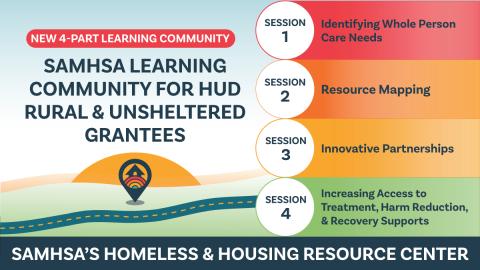Knowledge & Resources
Search and download a library of information and resources for health professionals and housing specialists.
Featured Article

This Learning Community for HUD Rural and Unsheltered grantees will focus on supporting Continuums of Care (CoCs) in understanding and building cross-system partnerships that address the needs of individuals and families impacted by substance use and/or mental disorders among those experiencing unsheltered homelessness and homelessness in rural areas.
Read MoreExplore The Resources
Filter
Clear AllResults
Article SAMHSA Learning Community for HUD Rural and Unsheltered Grantees
This Learning Community for HUD Rural and Unsheltered grantees will focus on supporting Continuums of Care (CoCs) in understanding and building cross-system partnerships that address the needs of individuals and families impacted by substance use and/or mental disorders among those experiencing unsheltered homelessness and homelessness in rural areas.
-
Toolkit Expanding Peer Support Roles in Homeless Services Delivery: A Toolkit for Service Providers
Peer support is a fast-growing occupation in the behavioral health sector and homeless service organizations can also benefit from its value. This toolkit guides organizations looking to strengthen peers' integration into their workforce.
-
Toolkit Coordinating Systems of Care to Provide a Comprehensive Behavioral Health Crisis Response to Individuals Experiencing Homelessness
This brief suggests strategies to enhance crisis care through multilevel coordination and describes practical approaches that systems of care can deploy to strengthen collaboration.
Fact Sheet Boosting the Power of Harm Reduction
This resource outlines strategies to build a coordinated and culturally responsive system of care for people with substance use disorders who are experiencing homelessness.
-
Toolkit Disaster Planning and Response: A Guide to Preparation for Homelessness Response Programs
This guide outlines questions that homelessness response programs should answer as they plan for and respond to natural disasters. The guide places a focus on the needs of people experiencing homelessness with serious mental illness (SMI), substance use disorder (SUD), or co-occurring disorders (CODs).